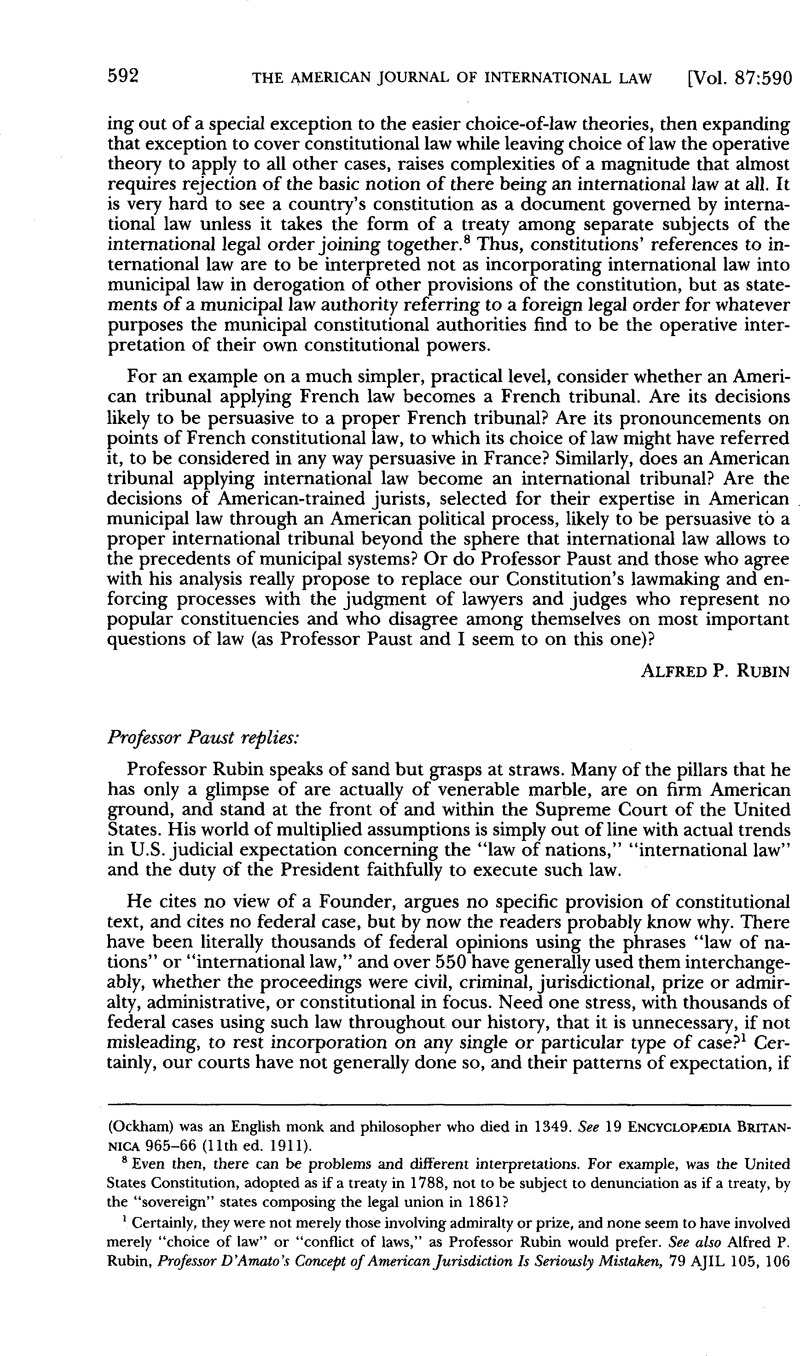No CrossRef data available.
Article contents
Abstract

- Type
- Notes and Comments
- Information
- Copyright
- Copyright © American Society of International Law 1993
References
1 Certainly, they were not merely those involving admiralty or prize, and none seem to have involved merely “choice of law” or “conflict of laws,” as Professor Rubin would prefer. See also Alfred P. Rubin, Professor D’Amato’s Concept of American Jurisdiction Is Seriously Mistaken, 79 AJIL 105, 106 (1985) (“a universal law … that has historically been considered part of public international law, including the law of belligerent prize, and … a universal law of nations that is denned to apply to all people, everywhere and at all times” “were popular in the late 18th century” and “are incorporated by implication in our Constitution,” as well as in “the Alien Tort Claims Act” of 1789 (emphasis added)). Further, no opinion that happened to involve a jurisdictional competence in admiralty or prize limited its recognition that the Executive is bound by the law of nations and/or international law to such a case. See, e.g., cases cited in Jordan J. Paust, The President Is Bound by International Law, 81 AJIL 377, 377–83 (1987); Correspondence, 87 AJIL 252, 252–54 (1993). Indeed, Justice Story in Brown v. United States, 12 U.S. (8 Cranch) 110 (1814), expressly related the “law of nations” to the President’s constitutional duty faithfully to execute “the laws.” Id. at 149; see also id. at 147, 153; Justice Story’s opinion in United States v. The Schooner Amistad, 40 U.S. (15 Pet.) 518, 594–96 (1841) (interchangeable use of law of nations and international law in response to individual claims and prevailing argument that the “federal executive” has no “power of making our nation accessories to … atrocious violations of human right,” id. at 553); Rubin, supra. Story's approach in Brown, although now anathema to Rubin, was entirely proper since such law is law of the United States. See, e.g., Jordan J. Paust, Customary International Law: Its Nature, Sources and Status as Law of the United State’s, 12 Mich. J. Int’l L. 59, 81–86 & nn.38–39, 44–47 (1990) [hereinafter Customary Law]; 1 Restatement (Third) or The Foreign Relations Law of the United States 40–41, §111 (1987). On the proposition that federal courts most often thought that the “law of nations” rested upon human expectations and practice (what we recognize as the two elements of customary international law), see, e.g., Paust, Customary Law, supra, at 59–61, 68–72.
2 Apparently, Bentham’s Introduction to the Principles was not cited until 1960, and has not been cited since. Indeed, any reference to Bentham has been extremely rare. For the view that his influence is speculative, see Alfred P. Rubin, The Law of Piracy 119–20 n.135 (1988). Even if he originated the phrase “international law” (cf. Mark Janis, Jeremy Bentham and the Fashioning of “International Law,” 78 AJIL 405, 408–09 (1984)), the philosophical meaning of its originator(s) did not spread as its only meaning, especially in the Americas. Indeed, such control over words may not be possible. Also, Joseph Story’s Commentaries on the Conflict of Laws (1834) was not cited often and in no known case is Rubin’s assumed “role” evident. Importantly also, “ ‘foreign laws’ ” (Story), “ ‘the laws of one nation’ ” (Story), the “ ‘law-merchant’ ” (Blackstone), and the law “maritime” as such were not really customary international law. Compare Story, supra, at 24, 33, 38, quoted in Alfred P. Rubin, Remarks, 82 ASIL Proc. 35 (1988) with Janis, supra, at 417; Paust, Customary Law, supra note 1, at 65–67 n.14, 80 n.34; Henry J. Steiner & Detlev F. Vagts, Transnational Legal Problems 579 (3d ed. 1986); Joseph M. Sweeney, Covey T. Oliver & Noyes E. Leech, The International Legal System 190 (3d ed. 1988). To pretend that the first three are customary international law or the “law of nations” as widely understood (see Rubin, Remarks, supra; Alfred P. Rubin, supra p. 590, 591 n.3 and text at notes 4–6; Rubin, Revisingthe Law of “Piracy,” 21 Cal. W. Int’l L.J. 129, 130–31 (1990) (confusing the “law of nations” with merely the domestic or “municipal law” of nations)) will deceive few others. See also Anthony D’Amato, Professor Rubin’s Reply Does Not Live up to Its Title, 79 AJIL 112, 113 (1985).




